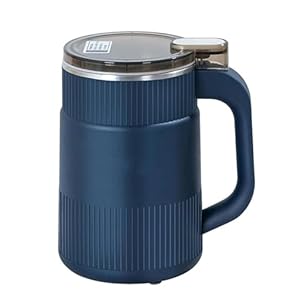The 10 Best Offers for Grinding Machines - March 2026
We already helped 10 million customers this year!
- Professional Grinding Blades:The electric herb grinder blades are made of high quality 304 stainless steel and can handle spices, grains, dried herbs, seeds, nuts, coffee beans and more. The improved shape of the blade allows for 360° all-round grinding and activates the original flavour of the food
- Safe and Easy to Use:Food grade stainless steel, sturdy and unbreakable. One-touch start switch design, easy to control the grinding coarseness with just one finger. Transparent top cover made of high quality material makes the whole grinding process clearly visible. The grinding time can be shortened or extended according to individual needs
- Efficient Grinding:Coffee bean grinder equipped with a powerful 300W motor (220V) and a capacity of 500ml, it can finish grinding in a short time. 30 times more efficient than conventional manual grinders. Built-in steel blade for fast cutting of finely ground powder
- Multi-purpose:Our mini spice grinder is perfect for daily or personal use, grinding a variety of dry/dehydrated materials including coffee beans, rice, seeds, peppercorns, masala, grains, spices, herb bits, flavouring materials and more. Materials with kernels or hard shells should be removed before grinding
- Warm Tips:To increase the life of the grain grinder machine, the spices grinder machine will automatically stop for 1-2 minutes after every 60 seconds of operation to prevent the machine from getting too hot
| Colour | Manufacturer | Weight |
| Blue | Buithafu | - |

- 【Multifunctional Grinder】-- Equipped with a powerful 300W motor (220v), with a capacity of 500ml, it can finish grinding in a short time. Compared with traditional manual grinders, the grinding efficiency is increased by 30 times, save a lot of time for you.
- 【Professional Grinding Blade】-- The blade is made of high-quality 304 stainless steel, one-piece steel cutter head, cutting quick fine grinding powder. It can handle spices, grain, dry medicinal herbs, seeds, nuts, coffee beans, etc.
- 【One-Press Operation】-- Designed with a simple push-down power operation to provide ergonomic efficiency, you can easily control the coarseness of grinding with just one finger. Load-Tight-Grind, just a few simple steps to complete the original tedious grinding work.
- 【Smart and Safe】-- The fully transparent top cover made of high-quality materials makes the entire grinding process clearly visible. Additionally, this makes the grinder safer to use as the blade will only start rotating when the lid is on the cup and being pressed downwards.
- 【Warm Note】-- In order to improve the service life of the machine, after working for 60 seconds each time, it will automatically stop for 1-2 minutes to prevent the temperature of the machine from being too high.
| Colour | Manufacturer | Weight |
| Blue | Sentechx | - |

- A POWERFUL ELECTRIC COFFEE GRINDER: The CG250 mini coffee grinder is equipped with a 250W motor which will effortlessly grind through your favourite coffee beans and turn them into powder. By freshly grinding beans as and when you need them, you will release a delicious flavour and aroma that is unlike any store-bought pre-ground coffee. It takes a matter of seconds to achieve and with the CG250 electric coffee grinder, you’ll find it very easy to create a mouth-watering cup of java every time.
- COFFEE THE WAY YOU LIKE IT: Whether you want to make Turkish coffee or espresso that requires very fine ground beans, or a French press or cold brew which requires coarsely ground beans, the CG250 electric coffee grinder allows you to achieve the grind size you need for the perfect coffee or cappuccino.
- PUSH-DOWN TOP OPERATION: Designed with a simple push-down power operation to provide ergonomic efficiency. The lid acts as a switch; with just a single touch the electric coffee grinder will start to pulse through the contents and will stop only when you lift your hand from the lid. Additionally, this makes the coffee bean grinder safer to use as the blade will only start rotating when the lid is on the cup and being pressed downwards.
- EASY TO USE AND CLEAN: A removable stainless-steel bowl is provided which enables you to easily remove the ground coffee beans from the electric coffee grinder to wherever you need it without having to take the whole machine with you. An additional benefit of the removable cup is that you can easily clean it after each use. It is important to ensure that the bowl is clean and dry before each use.
- FEATURES AND SPECIFICATIONS: Portable Coffee Grinder Bowl capacity: 75g. Cable storage area in the bottom of the coffee bean grinder. Non-slip feet. Stainless-steel bowl and blade. Power: 250W. Fitted with a BS British Standard 3 pin plug.
| Colour | Manufacturer | Weight |
| Black | Duronic | 75 g |

- 2-IN-1 WET AND DRY ELECTRIC COFFEE GRINDER: This all-in-one electric blade coffee grinder is the perfect kitchen accessory as it is versatile and can chop and grind both wet and dry ingredients. It comes with two stainless-steel cups, each with a different blade suited for wet and dry foods, so you can prepare a variety of foods such as nuts, seeds, beans, coffee, wheat, rice, fruits, vegetables and much more. The pots easily come off by turning anticlockwise.
- POWERFUL SPICE GRINDER: The CG421 coffee grinder / spice grinder is equipped with a 200W motor which will effortlessly grind through both dry and wet spices and herbs for use in cooking or baking. By freshly grinding your own spices you can save money, save on unnecessary packaging of jars and packets from store-bought spices, and create fresher tastier ingredients to use in your kitchen. Using the wet grinder cup, you could even make dips such as houmous, salsa or guacamole.
- STRONGER THAN OTHER COFFEE GRINDERS: Most other coffee grinders have a small 150W motor, while the CG421 portable coffee grinder has been designed with a robust 200W motor that works simply be pressing down on the top of the grinder. The clever lid acts as a switch for the unit, so as soon as you decide you are happy with the result you can release pressure and switch it off, saving unnecessary grinding time and electricity. Included is a handy double-ended brush scoop to facilitate filling and emptying the cups.
- ERGONOMICALLY DESIGNED: Two stainless-steel removable bowls are provided so you can easily move your ground ingredients around without having to move the whole grinder with it. This is also perfect for easy cleaning as the bowl is a separate part from the actual coffee grinder. the CG421 has rubber feet for gripping onto your worktop, cable management at the bottom of the unit and a clear lid with rubber grip so your hands do not slip while grinding.
- EASY TO USE AND CLEAN: Two removable stainless-steel bowl is provided which enables you to easily remove the ground coffee beans from the electric coffee grinder to wherever you need it without having to take the whole machine with you. An additional benefit of the removable cup is that you can easily clean it after each use. It is important to ensure that the bowl is clean and dry before each use.
- FEATURES AND SPECIFICATIONS: The transparent lid allows you to keep an eye on the consistency of grinding and acts as a splash guard to prevent any mess. The coffee grinder has two stainless-steel grinding cups are included: 1x wet cup and 1x dry cup. Cup capacity: 220ml/75g each. Cable management in the bottom of the spice grinder. Non-slip feet. Stainless-steel cups and blades. Power: 200W. Cable length: 80cm/31.5in. Fitted with a BS British Standard 3-pin plug.
- ENHANCE MOTOR LIFE: To enhance the motors life, you can use the item for 30 seconds, and rest for 3 minutes before next use. This strategy will increase the motors lifespan.
| Colour | Manufacturer | Weight |
| Silver | Duronic | 75 g |

- 【Portable Glass Grinder】Our glass grinder is equipped with a powerful motor that can reach speeds of up to 4200RPM, providing a high power output of 65W. It offers stable, fast, and efficient cutting when working on glass products, helping you achieve precise and perfect grinding and shaping of glass items.
- 【Acrylic Splash Guard】We have equipped the stained glass grinding machine with a transparent acrylic protective guard at the top, which can protect your eyes without obstructing your view of the current operation status. It also prevents glass particles generated during cutting from splashing around, making post-cleaning easier for you.
- 【Replaceable Diamond Grinding Head】This glass grinding tool comes with a default 5/8'' & 1" diamond grinding head and boasts a 6.5'' x 6.5' work surface. The high-quality diamond grinding head enhances the efficiency of glass grinding. You can also detach it and replace it with other sizes of grinding heads which is great for most small projects.
- 【Wide Application】Our glass grinder can be used not only for grinding glass but also for ceramics, jewelry, electronic components, and various other items, allowing you to quickly fulfill various DIY needs. It is easy to use, making it suitable for beginners to start using immediately.
- 【Comprehensive After-sales Service】We promise a one-year after-sales quality guarantee service. During this period, Any question about our glass grinder,please feel free to contact us,we will reply within 24h.
| Colour | Manufacturer | Weight |
| Blue | LengSuaa | - |

- Specifications: Grit: 80. Color: Green. Grinding Wheel Size: 75mm Overall Diameter, 10mm Inner Diameter, 20mm Height. Connecting shank diameter: 8mm
- Application: Suitable for grinding cast iron, brass, lead, zinc, rubber, leather, plastic, wood, ore, etc.
- Before Grinding: Please check whether the screws are tightened and the drill chuck is tightened to ensure safety. You can soak the wheel in water for 3 minutes before grinding metal for better results.
- While Grinding: The electric drill should be turned clockwise and turned at a low speed.
- Notice: As the grinding wheel is hard and brittle, the edge of the grinding wheel may be bumped or slightly damaged during transportation, but it will not affect the use of the product, please understand.
| Colour | Manufacturer | Weight |
| - | QWORK | 253 g |

General information about Grinding Machines:
Grinding machines, also known as grinders, play a crucial role in various industries, including manufacturing and construction. These machines are designed to remove excess material from workpieces through the use of abrasive wheels. They are utilized for tasks such as sharpening tools, producing smooth finishes on surfaces, and shaping materials to precise dimensions. With their versatile capabilities, grinding machines offer significant advantages in terms of efficiency, accuracy, and cost-effectiveness.
Various types of grinding machines are available on the market, each designed for specific applications. Cylindrical grinders, for example, are commonly used to shape cylindrical or round workpieces. Surface grinders, on the other hand, provide a flat surface finish on a workpiece. Other types include centerless grinders, tool and cutter grinders, and belt grinders, each with their own unique functions.
Grinding machines operate through spinning or rotating abrasive wheels, which are often made of silicon carbide or aluminum oxide. These wheels are bonded with various materials to achieve different levels of hardness and abrasiveness. During operation, the workpiece is held securely in place while the grinding wheel rotates at high speeds. The contact between the abrasive wheel and the workpiece leads to the removal of excess material, resulting in the desired shape, finish, or dimension.
Grinding machines offer numerous advantages in industries where precision and accuracy are essential. They allow for the production of intricate shapes and profiles that would be difficult to achieve with traditional machining methods. Additionally, they provide superior surface finishes, enhancing the overall quality of the workpiece. Furthermore, grinding machines are capable of high material removal rates, leading to increased productivity. With the use of computer numerical control (CNC) technology, grinding machines can also be automated, further improving efficiency.
In conclusion, grinding machines are vital tools in various industries, providing efficient and precise material removal. Their versatility and ability to achieve tight tolerances make them indispensable for tasks ranging from tool sharpening to surface finishing. As technology continues to advance, the capabilities of grinding machines will undoubtedly improve, further optimizing productivity and quality in manufacturing and construction processes.
** "Free Delivery" means that this is possible under the given conditions at the time of data retrieval from the relevant provider, but cannot be guaranteed. It is technically not possible to provide information in real-time. The shipping costs may vary under certain circumstances (different provider, place of delivery, etc.). The shipping costs shown in the further ordering process apply.
Other IMPORTANT INFORMATION that we ask you to take note of:
We may receive a commission if you make a purchase via the links on our site. This has no impact on the placement of the products on our site. Our website is part of amazon associates program - Amazon, Amazon Prime, the Amazon Logo and Amazon Prime Logo are registered trademarks of Amazon, Inc. or its affiliates.
Disclaimer:
1. The prices shown may have risen since the time we last updated them.
2. The actual price of the product on the seller’s site at the time of purchase will govern the sale.
3. It is not technically possible for the prices displayed above to be updated in real-time.










